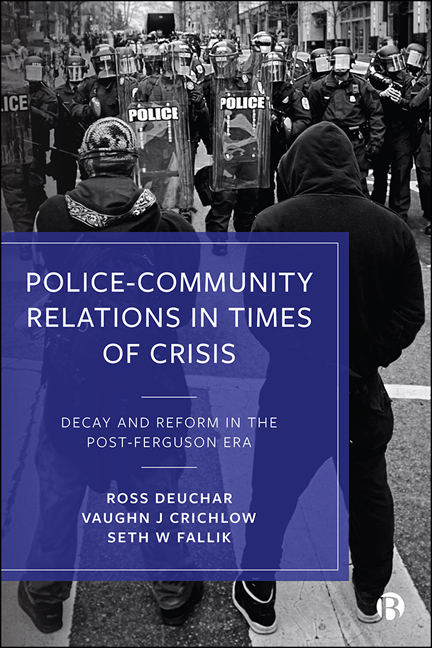4 - Proactive Policing of Gangs: Cops as “Guardians”
Published online by Cambridge University Press: 21 December 2021
Summary
Across the next two chapters, we turn specifically to the issue of police–community relations as they pertain to predominantly Black and Hispanic neighborhoods. We chronicle the law enforcement approaches we uncovered during our fieldwork, and relate these to the guardian-versus-warrior debate. In this chapter, we draw on the context of gang culture as an illustrative context for our analysis, and begin by discussing the reactive and proactive approaches that have been used to police gang violence and criminality in minority US neighborhoods over the years. In the main body of the chapter, insights from participant observation of police deployments and interventions at our fieldwork sites are shared, complemented by the voices of law enforcement officers captured via semi-structured interviews and informal conversations. We illustrate how an increased conceptual awareness of procedural justice had emerged among these officers. Case studies of proactive, community-centered policing approaches are shared that illustrate the active attempts that officers were making to enhance positive relationships, particularly with young Black men, and prevent violence in gang-affected neighborhoods. These insights are used to illustrate the ways in which officers were increasingly viewing themselves primarily as “guardians” in their approaches to the policing of gangs and the remaining challenges.
Reactive and proactive approaches to the policing of gang violence
As we outlined in Chapter 2, racial animus between police and residents has long been a problem in the US, largely due to a “normative police practice that targets Black individuals” (Cobbina, 2019, p 5). Aggressive policing strategies are disproportionately concentrated in disadvantaged communities populated by Black and Hispanic populations, and young men often describe their repeated exposure to unwelcome police contact and report less favorable evaluations of the police in comparison to their White counterparts (Brunson & Weitzer, 2009; Solis et al, 2009).
As we noted in Chapter 1, young Black and Hispanic men are also twice as likely as Whites to self-report gang membership in adolescence, and two to four times more likely to do so in adulthood (Pyrooz & Densley, 2018a, and see Chapter 6 for further discussion on gang culture and racial discrimination).
- Type
- Chapter
- Information
- Police-Community Relations in Times of CrisisDecay and Reform in the Post-Ferguson Era, pp. 57 - 80Publisher: Bristol University PressPrint publication year: 2021



